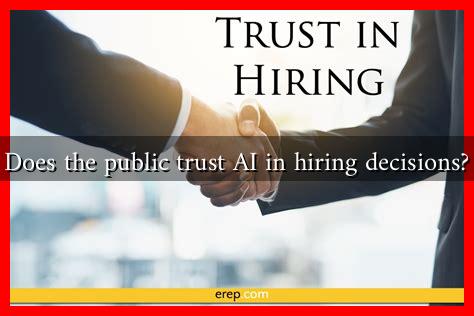-
Table of Contents
Does the Public Trust AI in Hiring Decisions?
As artificial intelligence (AI) continues to permeate various sectors, its role in hiring decisions has sparked significant debate. While some organizations embrace AI for its efficiency and data-driven insights, public trust in these technologies remains a complex issue. This article explores the current landscape of AI in hiring, examining public perceptions, potential biases, and the implications for the future of recruitment.
The Rise of AI in Recruitment
AI technologies have transformed the hiring process, offering tools that can streamline candidate sourcing, screening, and selection. Companies like HireVue and Pymetrics utilize AI algorithms to analyze resumes and assess candidates through video interviews and gamified assessments. The benefits of AI in hiring include:
- Efficiency: AI can process thousands of applications in a fraction of the time it would take a human recruiter.
- Data-Driven Decisions: AI systems can analyze vast amounts of data to identify the best candidates based on specific criteria.
- Reduced Bias: When programmed correctly, AI can help eliminate human biases that often affect hiring decisions.
Public Perception of AI in Hiring
Despite the advantages, public trust in AI for hiring decisions is not universally high. A survey conducted by Pew Research Center found that only 36% of Americans believe that AI can make fair hiring decisions. Concerns about transparency, accountability, and potential biases contribute to this skepticism.
Concerns About Bias and Fairness
One of the most significant issues surrounding AI in hiring is the potential for bias. AI systems learn from historical data, which can reflect existing prejudices. For instance, if an AI is trained on data from a company that has historically favored certain demographics, it may inadvertently perpetuate those biases. Notable cases include:
- Amazon’s AI Recruiting Tool: In 2018, Amazon scrapped an AI recruiting tool that was found to be biased against women. The system was trained on resumes submitted over a ten-year period, which were predominantly from male candidates.
- Google’s Job Search Algorithm: Google faced scrutiny when its job search algorithm was found to favor certain demographics, leading to calls for greater transparency in how these algorithms function.
The Need for Transparency
Transparency is crucial for building trust in AI systems. Many individuals are unaware of how AI algorithms make decisions, leading to fears of the “black box” phenomenon. To address these concerns, companies must prioritize:
- Clear Communication: Organizations should explain how their AI systems work and the data they use.
- Regular Audits: Conducting regular audits of AI systems can help identify and mitigate biases.
- Stakeholder Involvement: Engaging diverse stakeholders in the development and implementation of AI tools can lead to more equitable outcomes.
Case Studies: Successes and Failures
Examining real-world examples can provide insight into the effectiveness and challenges of AI in hiring. For instance, IBM has successfully implemented AI-driven tools that have improved diversity in hiring by focusing on skills rather than traditional qualifications. Conversely, the aforementioned Amazon case serves as a cautionary tale about the risks of bias in AI systems.
The Future of AI in Hiring
As AI technology continues to evolve, its role in hiring will likely expand. However, building public trust will require a concerted effort from organizations to address concerns about bias, transparency, and accountability. The future of AI in hiring may depend on:
- Ethical AI Development: Companies must prioritize ethical considerations in AI development to ensure fair outcomes.
- Regulatory Frameworks: Governments may need to establish regulations to govern the use of AI in hiring, ensuring that companies adhere to fair practices.
- Public Education: Increasing public awareness about how AI works and its potential benefits can help alleviate fears and build trust.
Conclusion
In conclusion, while AI has the potential to revolutionize hiring practices, public trust remains a significant hurdle. Concerns about bias, transparency, and accountability must be addressed to foster confidence in AI-driven hiring decisions. As organizations navigate this complex landscape, prioritizing ethical practices and engaging with stakeholders will be essential for building a future where AI is trusted and effective in recruitment.

